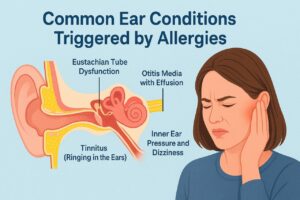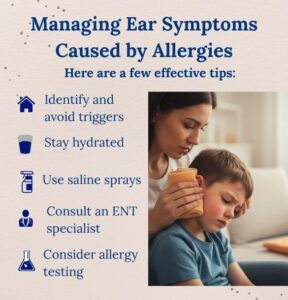
When most people think of seasonal allergies, they imagine sneezing, itchy eyes, and a runny nose. However, few realize that these allergies can also significantly affect the ears. The ears, nose, and throat are closely connected through the Eustachian tube, which helps maintain pressure balance and drainage in the middle ear. When allergies strike, they can easily disrupt this delicate balance—causing discomfort, muffled hearing, or even ear infections. Understanding this connection can help you manage symptoms better and seek timely care from an ENT specialist or the best ear hospital in India.
The Link Between Allergies and Ear Problems
Allergic reactions occur when your immune system overreacts to substances like pollen, dust, or mold. In response, the body releases histamines that cause inflammation and increased mucus production. This inflammation can block the Eustachian tube, trapping fluid and air inside the middle ear. As a result, you may experience symptoms such as:
- A feeling of fullness or pressure in the ear
- Temporary hearing loss
- Popping or crackling sensations
- Dizziness or imbalance
- Itching in the ear canal
For individuals who already have sinus issues or chronic allergies, these symptoms may occur more frequently and last longer during high pollen seasons.
Common Ear Conditions Triggered by Allergies
- Eustachian Tube Dysfunction: When inflammation blocks this tube, it prevents proper ventilation of the middle ear, leading to pressure build-up.
- Otitis Media with Effusion: Allergies can cause fluid accumulation in the middle ear, sometimes leading to infection or hearing difficulty.
- Inner Ear Pressure and Dizziness: Allergic inflammation can affect balance mechanisms, causing dizziness or vertigo-like sensations.
- Tinnitus (Ringing in the Ears): Though not caused directly by allergies, congestion can worsen tinnitus in susceptible individuals.

Managing Ear Symptoms Caused by Allergies
Proper allergy management can go a long way in preventing ear complications. Here are a few effective tips:
- Identify and avoid triggers: Use air purifiers, keep windows closed during high pollen days, and regularly clean your living spaces.
- Stay hydrated: This helps thin mucus and reduces congestion.
- Use saline sprays or steam inhalation: These can relieve nasal and ear pressure naturally.
- Consult an ENT specialist: If symptoms persist, an ENT doctor can assess your ear health and recommend medications or procedures to relieve blockages.
- Consider allergy testing: Identifying the root cause allows for targeted treatment and prevention.

When to Seek Medical Help
If you experience persistent ear pain, hearing loss, or dizziness during allergy season, don’t ignore it. Over-the-counter antihistamines may provide short-term relief, but ongoing issues could point to a more serious condition. Seeking care from experienced professionals ensures accurate diagnosis and effective treatment.
Conclusion
Seasonal allergies can do more than make you sneeze—they can impact your hearing and overall ear health. Early intervention and proper medical guidance from an ENT specialist are essential to avoid long-term complications. For comprehensive ear care, accurate diagnosis, and advanced treatment, visit Indorewala ENT Hospital, recognized among the best ear hospitals in India for its expert team and state-of-the-art facilities.
